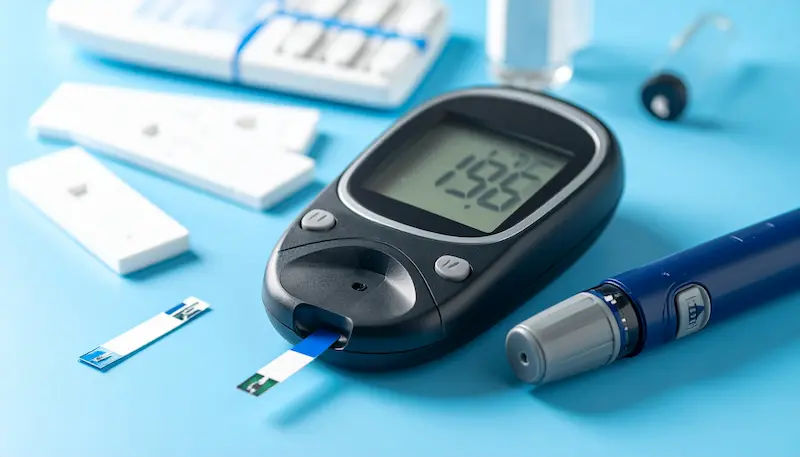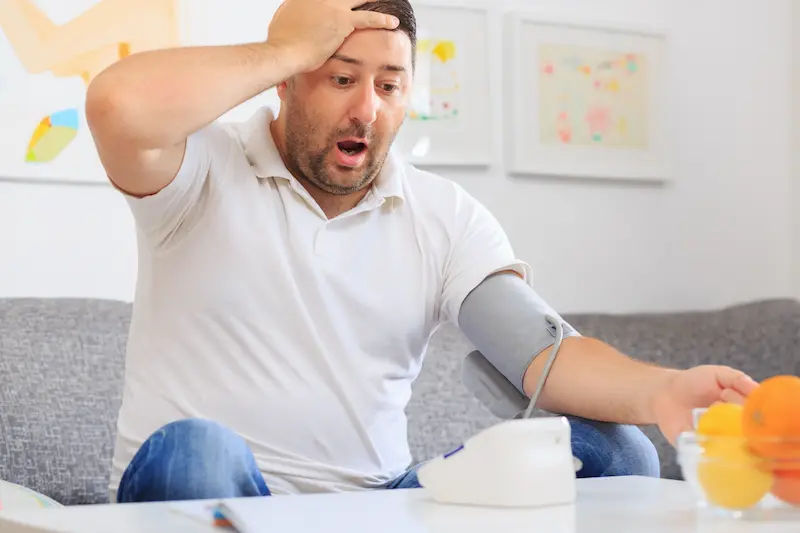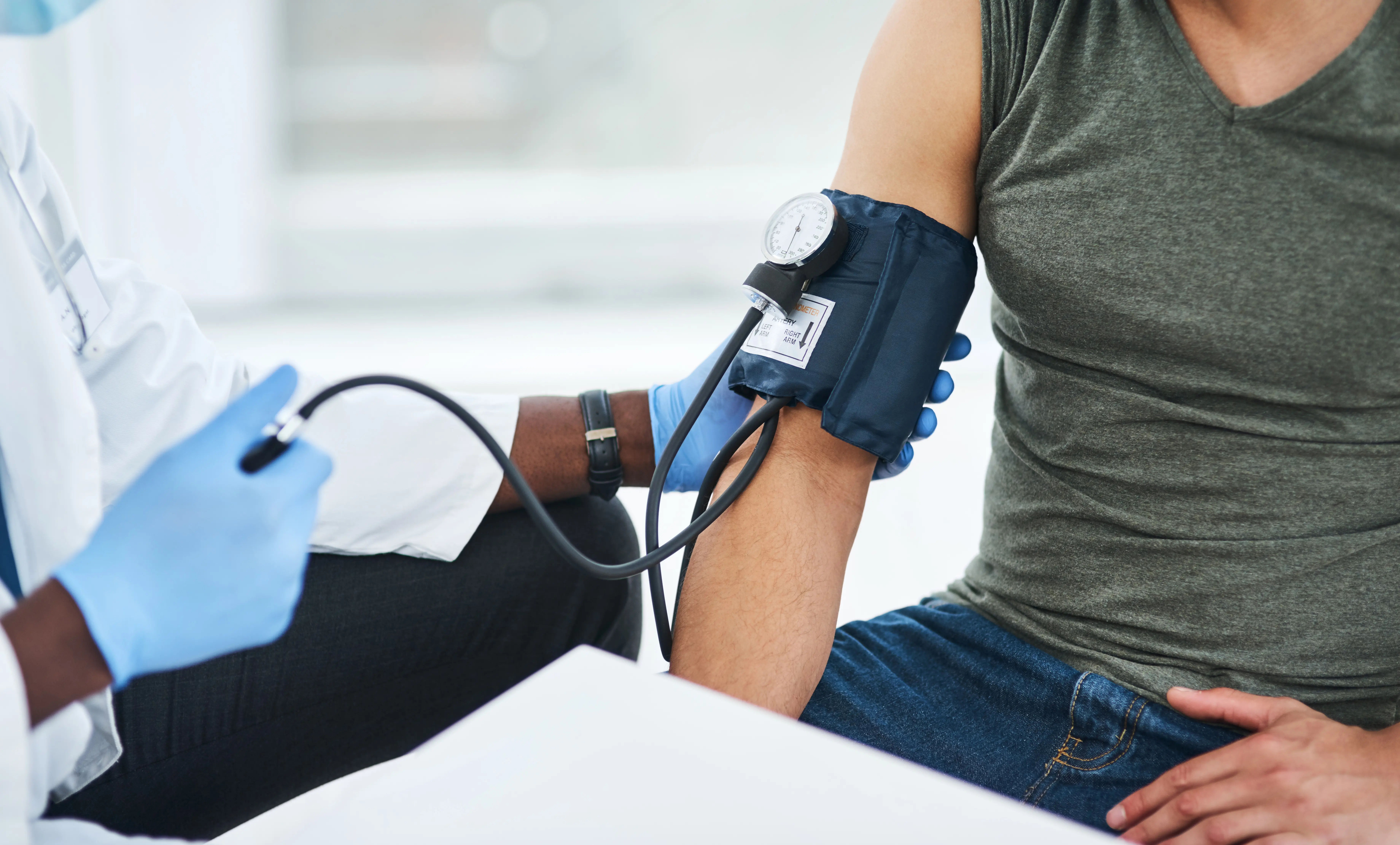A Complete Guide to High and Low Blood Pressure
Navigate the complexities of your cardiovascular health. Our guide explains the causes, symptoms, and management strategies for both high and low blood pressure to help you stay in control.

Written by Dr. J T Hema Pratima
Reviewed by Dr. Rohinipriyanka Pondugula MBBS
Last updated on 13th Jan, 2026

Introduction
Your blood pressure is a vital sign, a fundamental measure of your health that tells the story of how hard your heart is working to pump blood throughout your body. When this delicate balance is disrupted, it can lead to two common conditions: hypertension (high blood pressure) and hypotension (low blood pressure). While often discussed separately, understanding both is crucial for a complete picture of your cardiovascular wellbeing. This silent force can operate for years without obvious symptoms, making education your first and best line of defense. This comprehensive guide will demystify both high and low blood pressure, breaking down their causes, potential risks, and the practical steps you can take to manage them effectively. Whether you're looking to prevent future issues or manage an existing diagnosis, we'll provide the insights you need to take control of your health.
Understanding Blood Pressure: The Basics
What Do the Numbers Mean?
When your doctor tells you your blood pressure is "120 over 80," they are referring to two distinct forces measured in millimeters of mercury (mmHg).
Systolic Pressure (the top number): This measures the pressure in your arteries when your heart beats and pumps out blood.
Diastolic Pressure (the bottom number): This measures the pressure in your arteries when your heart is at rest between beats.
Both numbers are equally important. A significant rise in either can indicate hypertension, while a severe drop in either can signal problematic hypotension.
How Blood Pressure is Regulated in the Body?
Your body is a master regulator, using a complex system involving your heart, blood vessels, kidneys, and nervous system to maintain stable blood pressure. Key factors include:
The amount of blood your heart pumps.
The width and flexibility of your arteries.
The volume of blood in your circulatory system.
When any of these elements are thrown off balance, blood pressure fluctuations can occur.
The Silent Killer: High Blood Pressure (Hypertension)
Defining Hypertension and Its Categories
Hypertension is not a single value but a range. The American Heart Association categorizes it as follows:
Blood Pressure Categories
| Category | Systolic (mm Hg) | Diastolic (mm Hg) | Relation |
| Normal | < 120 | < 80 | and |
| Elevated | 120-129 | < 80 | and |
| Hypertension Stage 1 | 130-139 | 80-89 | or |
| Hypertension Stage 2 | 140 or higher | 90 or higher | or |
| Hypertensive Crisis | > 180 | > 120 | and/or |
This table outlines the categories of blood pressure based on the latest guidelines. A reading can fall into a category based on either systolic or diastolic pressure. For example, to be diagnosed with Hypertension Stage 1, a patient must have either a systolic pressure between 130-139 mm Hg or a diastolic pressure between 80-89 mm Hg.
Common Causes and Risk Factors
Often, there's no single identifiable cause for high blood pressure (primary hypertension), which develops gradually over years. Key risk factors for hypertension include:
Age: Risk increases as you get older.
Family History: Hypertension tends to run in families.
Race: It is more common in people of African heritage.
Obesity: The more you weigh, the more blood you need to supply oxygen, increasing arterial pressure.
Sedentary Lifestyle: Lack of physical activity raises heart rate, forcing your heart to work harder.
Tobacco Use: Chemicals in tobacco can damage the lining of your artery walls.
HighSodium Diet: Too much salt causes your body to retain fluid.
Chronic Conditions: Kidney disease, diabetes, and sleep apnea are significant contributors.
Recognizing the Symptoms of High Blood Pressure
This is why hypertension is dubbed the "silent killer." It typically has no warning signs or symptoms. Even when blood pressure readings reach dangerously high levels, most people experience nothing. A small number may have early morning headaches, nosebleeds, or shortness of breath, but these are nonspecific and often occur only when blood pressure has reached a severe or life-threatening stage.
Consult a General Physician for the best advice
When Pressure Drops: Low Blood Pressure (Hypotension)?
What Constitutes Low Blood Pressure?
While hypertension is defined by specific numbers, hypotension is clinically significant only if it causes symptoms. Generally, a reading lower than 90 mm Hg systolic or 60 mm Hg diastolic is considered low blood pressure.
Types and Causes of Hypotension
There are several forms of low blood pressure, each with different triggers:
Orthostatic Hypotension: A sudden drop in blood pressure when standing up from sitting or lying down. It's common in older adults and can be caused by dehydration or certain medications.
Postprandial Hypotension: A drop in blood pressure that occurs 12 hours after eating, primarily affecting older adults.
Neurally Mediated Hypotension (NMH): A miscommunication between the heart and the brain, often triggered by standing for long periods.
Severe Hypotension: Linked to shock, a life-threatening condition where the body's organs don't get enough blood and oxygen. This can be caused by major blood loss, severe infection, or heart failure.
Symptoms of Low Blood Pressure
Unlike its high counterpart, hypotension often announces itself. Signs of low blood pressure include:
Dizziness or lightheadedness
Fainting (syncope)
Blurred or narrowing vision
Nausea
Fatigue and lack of concentration
Cold, clammy, pale skin
The Dangers of Unmanaged Blood Pressure
Long-Term Risks of Hypertension
Sustained high pressure damages your entire circulatory system. The dangers of high blood pressure are severe and include:
Heart Attack or Stroke: Hardened and narrowed arteries can lead to blockages.
Aneurysm: Increased pressure can cause a bulge in a blood vessel wall, which can burst.
Heart Failure: Pumping against high pressure thickens the heart muscle, eventually leading to failure.
Kidney Damage: Can weaken and narrow blood vessels in the kidneys, preventing proper function.
Vision Loss: Can strain or damage blood vessels in the eyes.
When is Low Blood Pressure a Concern?
For many, low blood pressure is a sign of good health. However, a sudden drop or chronically low pressure that causes symptoms can be problematic. It can lead to:
Falls and Injuries: Dizziness and fainting can lead to dangerous falls, especially in the elderly.
Shock: The most severe complication, which can be fatal if not treated immediately.
Underlying Health Issues: It can sometimes point to serious neurological, endocrine, or heart conditions.
Diagnosis and Monitoring
How Blood Pressure is Measured?
Diagnosis is straightforward with a blood pressure cuff (sphygmomanometer). For an accurate reading, avoid caffeine, exercise, and smoking for at least 30 minutes prior. Sit quietly for five minutes with your back supported and feet flat on the floor.
The Role of Home Blood Pressure Monitoring
For those with or at risk for hypertension, home blood pressure monitoring is a powerful tool. It provides a clearer picture of your blood pressure over time and in your daily environment, helping your doctor make better treatment decisions. Ensure you use a validated, automatic, upper arm cuff device.
Management and Treatment Strategies
Lifestyle Changes for High Blood Pressure
This is the first and most crucial line of defense for managing hypertension. Effective natural ways to lower blood pressure include:
The DASH Diet: An eating plan rich in fruits, vegetables, whole grains, and low fat dairy.
Reducing Sodium Intake: Aim for less than 2,300 mg per day (ideally 1,500 mg for most adults).
Regular Exercise: At least 150 minutes of moderate intensity aerobic activity per week.
Maintaining a Healthy Weight: Losing even 510 pounds can make a significant difference.
Limiting Alcohol and Quitting Smoking.
Medical Treatments for Hypertension
If lifestyle changes aren't enough, several classes of medications can help, including:
Diuretics ("water pills")
ACE inhibitors
Angiotensin II receptor blockers (ARBs)
Calcium channel blockers
Your doctor will determine the best type or combination for you.
Managing and Treating Low Blood Pressure
Treatment for hypotension depends on the cause. For symptomatic cases, strategies may include:
Increasing Water and Salt Intake (as advised by a doctor).
Wearing Compression Stockings to prevent blood from pooling in the legs.
Medications like fludrocortisone or midodrine to raise blood pressure.
Changing Eating Habits (smaller, lowcarb meals to combat postprandial hypotension).
Conclusion
Understanding and managing your blood pressure is one of the most impactful steps you can take for your long-term health. Whether you're working to bring high numbers down or address the symptoms of low pressure, knowledge empowers you to take action. Remember, hypertension demands respect and proactive management to prevent its serious complications, while symptomatic hypotension requires identifying its root cause. By embracing healthy lifestyle choices, adhering to medical advice, and monitoring your numbers, you can maintain a healthy cardiovascular system and significantly improve your quality of life. Don't wait for symptoms to appear—take control of your blood pressure today.
Consult a General Physician
Consult a General Physician for the best advice

Dr Aakash Andgi
General Physician/ Internal Medicine Specialist
9 Years • MBBS MD
Bengaluru
Apollo Clinic, JP nagar, Bengaluru

Dr. Vivek D
General Physician
4 Years • MBBS
Bengaluru
PRESTIGE SHANTHINIKETAN - SOCIETY CLINIC, Bengaluru

Dr. Anand Ravi
General Physician
2 Years • MBBS
Bengaluru
PRESTIGE SHANTHINIKETAN - SOCIETY CLINIC, Bengaluru

Dr Syed Mateen Pasha
General Physician
2 Years • MBBS
Bengaluru
PRESTIGE SHANTHINIKETAN - SOCIETY CLINIC, Bengaluru

Dr. Harshendra Jaiswal
General Physician/ Internal Medicine Specialist
12 Years • MBBS , MD (General medicine)
Kolkata
108 DHANA DHANVANTARI Clinic, Kolkata
(25+ Patients)
Consult a General Physician

Dr Aakash Andgi
General Physician/ Internal Medicine Specialist
9 Years • MBBS MD
Bengaluru
Apollo Clinic, JP nagar, Bengaluru

Dr. Vivek D
General Physician
4 Years • MBBS
Bengaluru
PRESTIGE SHANTHINIKETAN - SOCIETY CLINIC, Bengaluru

Dr. Anand Ravi
General Physician
2 Years • MBBS
Bengaluru
PRESTIGE SHANTHINIKETAN - SOCIETY CLINIC, Bengaluru

Dr Syed Mateen Pasha
General Physician
2 Years • MBBS
Bengaluru
PRESTIGE SHANTHINIKETAN - SOCIETY CLINIC, Bengaluru

Dr. Harshendra Jaiswal
General Physician/ Internal Medicine Specialist
12 Years • MBBS , MD (General medicine)
Kolkata
108 DHANA DHANVANTARI Clinic, Kolkata
(25+ Patients)
More articles from High Blood Pressure
Frequently Asked Questions
1. Can you have high blood pressure and still feel fine?
Yes, absolutely. This is why hypertension is called the 'silent killer.' Most people experience no symptoms, even when their readings are dangerously high. Regular screening is essential.
2. What is considered a dangerous low blood pressure reading?
A reading below 90/60 mm Hg is typically classified as low. However, the danger is in the symptoms. If a low reading is accompanied by dizziness, fainting, or shock, it requires immediate medical attention
3. How can I quickly lower my blood pressure in a pinch?
There is no safe, proven way to instantly lower blood pressure without medical supervision. Long-term management through lifestyle changes and prescribed medication is the only effective approach. In a hypertensive crisis (180/120 or higher), seek emergency care.
4. Does anxiety cause high blood pressure?
Anxiety can cause temporary spikes in blood pressure, but it does not typically cause chronic hypertension. However, frequent anxiety-induced spikes may contribute to long-term damage, much like chronic hypertension.
5. Are home blood pressure monitors accurate?
Yes, modern automatic, upper arm cuff monitors are generally very accurate if used correctly. It's important to choose a device validated by medical associations and to check its calibration with your doctor's device periodically.




